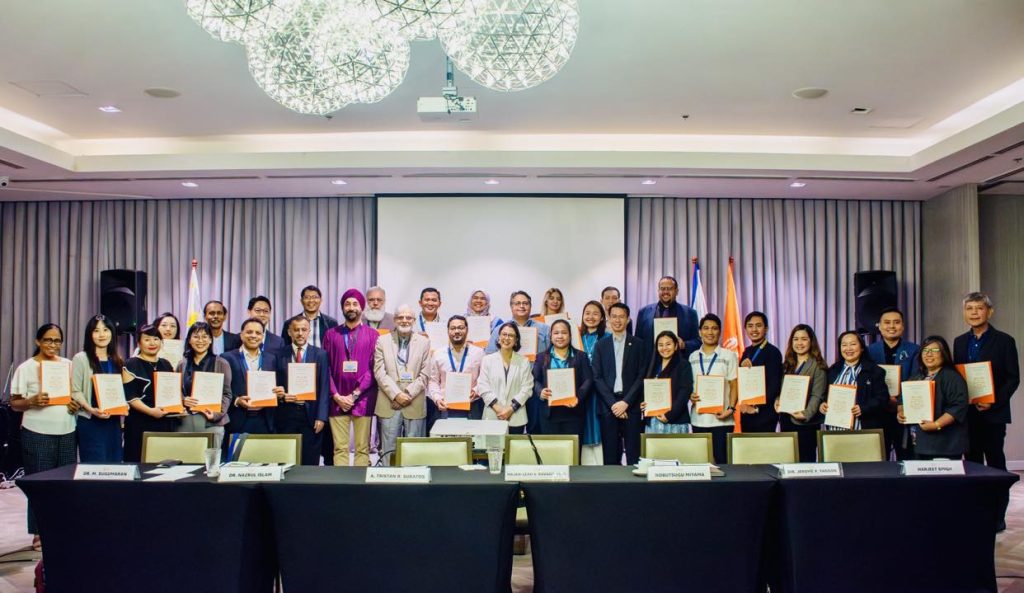
On May 20-24, 2024, the Asian Productivity Organization (APO), in cooperation with the Development Academy of the Philippines (DAP), conducted the Training Course on Gainsharing in Agribusiness Enterprise. This event saw participation from 26 delegates representing 18 out of its 25 member countries. Cherryl Catrina Marders, a Senior Cooperative Development Specialist from the Cooperative Research, Information, and Training Division (CRITD), represented the Cooperative Development Authority (CDA). The goal of the training was to introduce gainsharing concepts and explore methodologies, approaches, and models across the entire value chain of the agriculture sector.
During the five-day training course, lectures focused on the key concepts of gainsharing and the importance of government policies and leadership support in promoting these practices. Additionally, best practices from Malaysia, Bangladesh, India, and the Philippines were presented through case studies and gainsharing models in the agriculture sector. Key strategic initiatives, participatory planning, and systematic approaches were comprehensively discussed.
In the Philippines, gainsharing is practiced in various sectors of the economy, commonly known as productivity-based incentives or performance-based programs. The National Wages Productivity Commission (NWPC), an attached agency of the Department of Labor and Employment (DOLE), is tasked with developing policies and guidelines on wages, incomes, and productivity.
The NWPC has identified several metrics to measure the improved performance of an enterprise, including reduction in hours worked to produce a given volume of goods and services, reduction in defects or costs of rejects and reworks, increase in the level of customer service or satisfaction, reduction in process inventory and energy usage, improvement in raw material yield, reduction in downtime and maintenance costs, and reduction in materials, supplies, and other variable costs.
A survey conducted by the NWPC, presented by Director of Technical Service Mr. Jerome P. Yanson, highlighted the implementation of the Productivity Improvement Program (PIP) in major establishments. Out of the 38,305 surveyed establishments in the private sector employing 20 or more workers, only 1.3% of the Agriculture, Forestry, and Fishing (AFF) Industry implements the PIP, with about 5.4% of these being cooperatives.
One cooperative implementing gainsharing or productivity-based programs is the Soro-soro Ibaba Development Cooperative (SIDC) based in Batangas City. Delegates visited SIDC, where officers presented their gainsharing practices. Examples of SIDC’s productivity-based incentives range from monetary to non-monetary benefits, including training, travel, education, and scholarships.
Agribusiness gainsharing initiatives are significantly impacting Philippine cooperatives by enhancing their competitiveness and sustainability in the agriculture sector. These initiatives focus on improving the operational efficiency and market integration of cooperatives, which are crucial for the livelihoods of many smallholder farmers in the Philippines.
Further, the USAID, in collaboration with Agriterra Philippines, implemented the GROW Coop (Generating Rural Opportunities by Working with Cooperatives) Project. This project aims to transform successful agri-based cooperatives, federations, and other relevant organizations into Local Resource Organizations (LROs) that provide mentoring, capacity development, and to help cooperatives participate more effectively in value chains. Initiatives like Coops4Food enhance market access for farmers through coop-to-coop trading and business continuity training. Agriterra Philippines has partnered with primary cooperatives such as SIDC, cooperative federations, and private organizations to become LROs.
Additionally, ACDI/VOCA (Agricultural Cooperative Development International/Volunteers in Overseas Cooperative Assistance) signed a memorandum of understanding with the Philippine Family Farmers Agriculture-Fishery-Forestry Cooperatives Federation (AgriCooPh) to enhance the capabilities of agricultural cooperatives across the country. This partnership aims to make cooperatives more inclusive and sustainable, providing development tools and capacity-building resources to improve operations and market integration.
At the end of the training period, the delegates crafted an action plan that could be replicated, adapted, or implemented in their countries. They also committed to promoting gainsharing practices within their organizations and among stakeholders to ensure a multiplier effect of positive results. – Cherryl Marders






